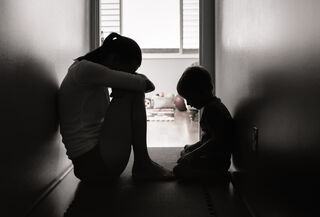Adverse Childhood Experiences
Parenting, Caregiver ACEs, and the Ongoing Pandemic
How to better understand and support stressed parents and caregivers.
Posted March 16, 2022 Reviewed by Abigail Fagan
Key points
- Caregivers are under an enormous amount of stress due to many factors, including the pandemic.
- Increased stress can lead to compromised parenting approaches, bringing additional tension.
- Support and self-care for caregivers are top contributors to stress regulation and the ability to provide nurturing caregiving.
This post was co-authored by Sarah MacLaughlin, LSW, and Rahil Briggs, Psy.D.
Masks may be coming off, but the stress level of caregivers with young children is still considerable. With no vaccine for children age five and under, there is still worry about illness and now the additional anxiety of a war happening in Ukraine, rising inflation, formula shortages, political battles involving children, and seemingly more and more.

Unfortunately, caregiver stress has a habit of trickling down to land on young children. Additionally, many babies and toddlers were quarantined at home for long periods of time throughout the pandemic, leading to disrupted routines, less outside time and physical activity, and less connection with peers—an unprecedented situation likely to have caused stress and impacted their well-being (Babore et al., 2021).
With caregivers stretched thin, stress has gotten so complex and heightened it may be leading to negative parenting practices, especially for caregivers with substantial adverse childhood experiences (ACEs) (Hails et al., 2021).
What do ACEs have to do with it?
It’s important to consider caregiver ACEs because unmitigated, they can predict a baseline level of stress that existed before the challenges of the last three years were introduced. A recent study found that a history of parental ACEs connected COVID-19 distress with both negative parenting and child emotional/behavioral problems, making each relationship stronger for parents with higher ACEs (Hails et al., 2021). When practitioners understand ACEs and are trained in providing emotional safety, they can apply a trauma-informed lens, vital as we enter year three of the pandemic.
Policy changes and community resources can also reduce COVID-19 related family distress, help decrease negative parenting practices, and reduce the risks of youth emotional/behavioral problems and child maltreatment (Hails et al., 2021). We know what works: the return of the expanded child tax credit, support for more integrated pediatric primary care practices and “reverse integration” of primary care in behavioral health practices, and subsidized child care to bolster working caregivers.
Shifting the “window of tolerance”
A person’s window of tolerance refers to the “happy medium” level of emotional arousal that allows for them to manage the ups and downs in life. Stress and trauma can narrow the window of tolerance, making it easy to feel off balance. Arousal that is too high (anxiety, overwhelm, anger) or too low (lethargy, depression, numbness) can impair one’s ability to function. When caregivers understand and can increase their window of tolerance, it goes a long way in helping them reasonably manage stress. Practitioners can assist in many ways including implementing a two-generation approach, meeting parents where they dream, and offering as much support as possible for weary parents.
Caregivers and families continue to face the ongoing uncertainty of a rapidly changing world. It will benefit families and practitioners for us to collectively attend to the long-term effects of the pandemic (impact on family distress, parenting practices, and child behavior), particularly as families adjust to a new post-pandemic world, whatever that might look like, and however that may eventually be defined (Hails et al., 2021). Regardless of the future we face, practitioners can improve caregivers’ understanding of their past and how it affects their current parenting approach, setting the stage for skill-building and growth by providing resources such as mindfulness tools, practices for supporting family separations, and other ways to assist struggling families.
References
Babore, A., Trumello, C., Lombardi, L., Candelori, C., Chirumbolo, A., Cattelino, E., Baiocco, R., Bramanti, S. M., Viceconti, M. L., Pignataro, S., & Morelli, Mara. (2021). Mothers’ and Children’s Mental Health During the COVID-19 Pandemic Lockdown: The Mediating Role of Parenting Stress. Child Psychiatry Hum Dev, https://doi.org/10.1007/s10578-021-01230-6
Hails, K. A., Petts, R. A., Hostutler, C. A., Simoni, M., Greene, R., Snider, T. C., & Riley, A. R. (2021). COVID-19 distress, negative parenting, and child behavioral problems: The moderating role of parent adverse childhood experiences. Child abuse & neglect, 105450. Advance online publication. https://doi.org/10.1016/j.chiabu.2021.105450
How to Help Your Clients Understand Their Window of Tolerance [Infographic]. (n.d.). Retrieved from: https://www.nicabm.com/trauma-how-to-help-your-clients-understand-their…


